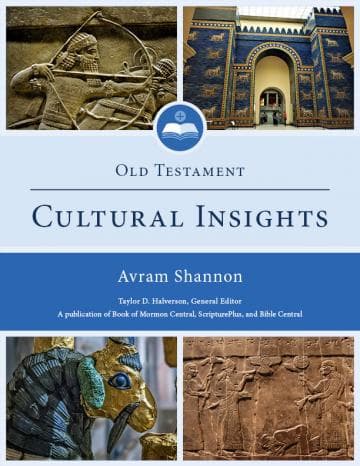Book
71 Chapters

Anointing is the process of smearing or rubbing oil on a body. Objects as well as people could be anointed. In the Old Testament anointing is associated with the calling and sanctification of kings and priests. The anointing oil used in these contexts appears to have been perfumed (Exodus 25:6).
During the consecration of the tabernacle and the appointment of Aaron as priest, Aaron was washed and then anointed with olive oil (Exodus 40:12–13). Leviticus describes the priest who officiates in the sacrificial system as “the priest that is anointed” (see, for example, Leviticus 4:3). Occasionally in the Old Testament, we find examples of prophets being anointed as part of their calling, as when Jehovah instructed Elijah to anoint Elisha as his successor (1 Kings 19:15–16).
Anointing is associated in the Old Testament with kings far more than with prophets or even priests. When Jehovah had Samuel chose Saul as king over Israel, Samuel anointed Saul and asked rhetorically, “Is it not because the Lord hath anointed thee to be captain over his inheritance?” (1 Samuel 10:1). Similarly, when David was chosen to succeed Saul as king, Samuel anointed him with oil (1 Samuel 16:12–13). Solomon was anointed by Zadok, who was priest over the tabernacle (1 Kings 1:39). Anointing was the distinctive ceremony for crowning the Israelite king, a process that set them apart from the rest of Israel and, like for priests, turned them into holy individuals. This is clear even in Book of Mormon examples, which describe the process of appointing kings using language of anointing, such as “anoint” (Jacob 1:9) and “consecrate” (Mosiah 6:3).
Because of this association, one of the distinctive titles of the ancient Israelite (and then Judahite) king was “the Lord’s anointed.” We see this description as early as with Hannah’s song in 1 Samuel 2:10. David specifically refused to kill Saul when he had him in his power because as the Lord’s anointed, Saul still had Jehovah’s protection (1 Samuel 24:6–10). This kingly title appears a number of times in the Psalms (see, among others, Psalms 2:2; 20:6). Perhaps surprisingly to the ancient audience, the non-Israelite, Persian king Cyrus is identified as the Lord’s anointed in Isaiah 45:1.
The Hebrew “to anoint” is mašaḥ, and so the anointed one is the Messiah. The title Christ derives from a Greek word that means the same thing. Jesus’s claim to be the Messiah and the Christ (the same claim in different languages) is fundamentally a claim to kingship. The previous kings were anointed as a symbol pointing to the great king and anointed one who would sit on David’s throne forever (2 Samuel 7:16).
Genesis 31:13
Genesis 25:6
Exodus 25:6
Exodus 28:40–41
Exodus 29:6–21
Exodus 30:25–26
Exodus 31:11
Exodus 35:8
Exodus 37:29
Exodus 40
Leviticus 4:3–5
Leviticus 6:22
Leviticus 7:35
Leviticus 8:10–12
Numbers 35:25
Judges 9:8
1 Samuel 2:35
1 Samuel 9:16
1 Samuel 10:1
1 Samuel 12:3
1 Samuel 15:1–17
1 Samuel 16:6, 13
1 Samuel 24:6–11
1 Samuel 26:7–16
2 Samuel 1:14
2 Samuel 2:7
2 Samuel 3:39
2 Samuel 5:3
2 Samuel 12:7
2 Samuel 19:10
2 Samuel 22:51
2 Samuel 23:1
1 Kings 1:34–40
1 Kings 5:1
1 Kings 19:15–16
2 Kings 9:3–12
2 Kings 11:11
2 Kings 23:30
1 Chronicles 29:22
2 Chronicles 6:42
Psalm 2:2
Psalm 18:50
Psalm 20:6
Psalm 28:8
Psalm 45:7
Psalm 84:9
Psalm 89:20–21, 51
Psalm 132:10
Isaiah 45:1
Isaiah 61:1–3
Lamentations 4:20
Habakkuk 3:13
Zechariah 4:14
Book
71 Chapters
Items in the BMC Archive are made publicly available for non-commercial, private use. Inclusion within the BMC Archive does not imply endorsement. Items do not represent the official views of The Church of Jesus Christ of Latter-day Saints or of Book of Mormon Central.